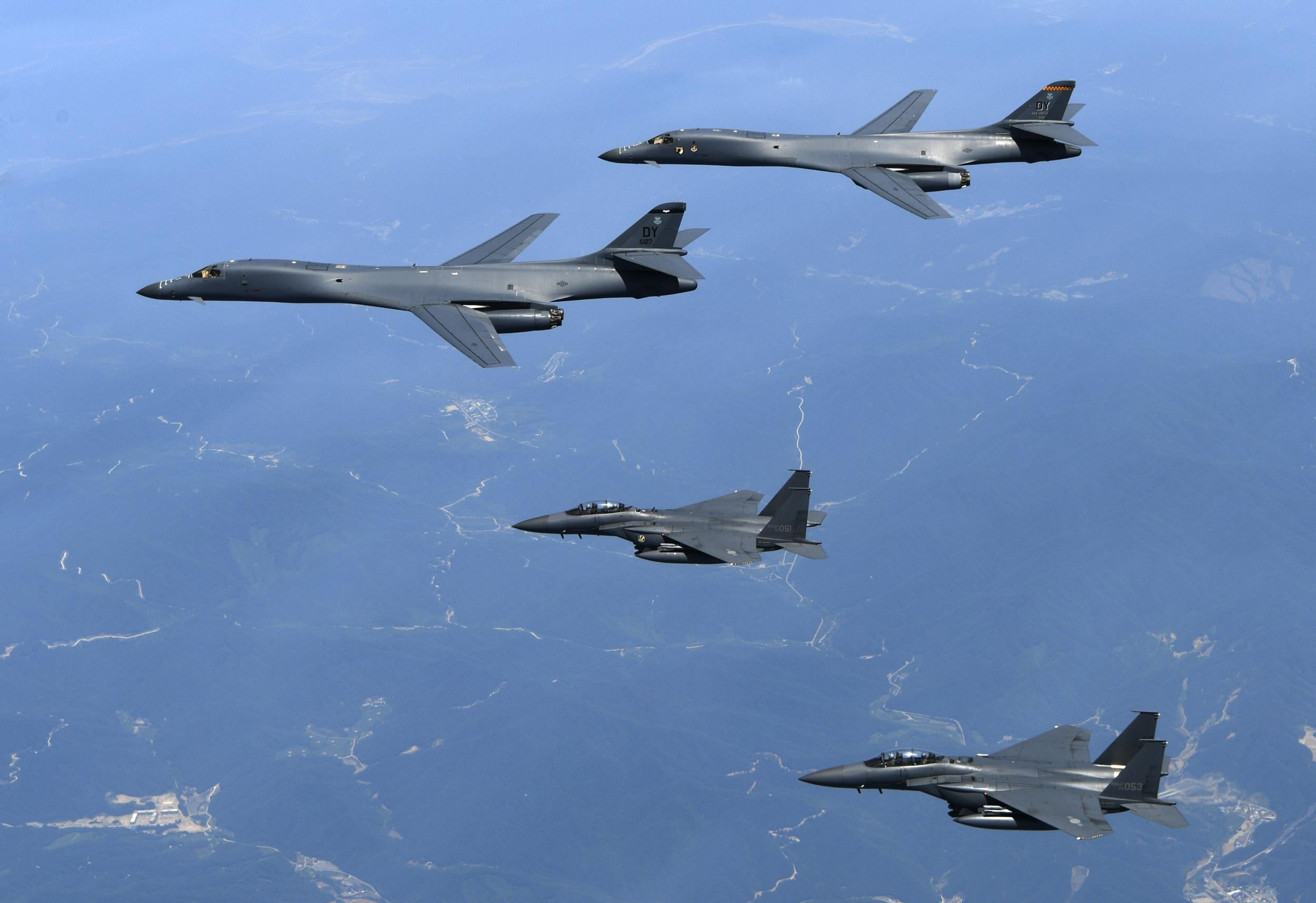North Korea accuses US of 'trying to ignite nuclear war' with bomber drills
Pyongyang claims 'gangster-like US imperialists' carried out drills for a 'surprise nuclear strike'

Your support helps us to tell the story
From reproductive rights to climate change to Big Tech, The Independent is on the ground when the story is developing. Whether it's investigating the financials of Elon Musk's pro-Trump PAC or producing our latest documentary, 'The A Word', which shines a light on the American women fighting for reproductive rights, we know how important it is to parse out the facts from the messaging.
At such a critical moment in US history, we need reporters on the ground. Your donation allows us to keep sending journalists to speak to both sides of the story.
The Independent is trusted by Americans across the entire political spectrum. And unlike many other quality news outlets, we choose not to lock Americans out of our reporting and analysis with paywalls. We believe quality journalism should be available to everyone, paid for by those who can afford it.
Your support makes all the difference.North Korea has accused America of attempting to "ignite a nuclear war" after two US strategic bomber planes carried out drills in the region.
Pyongyang claimed the exercises, also involving South Korean and Japanese fighter jets, were a "surprise nuclear attack drill" simulating an attack on key North Korean targets.
News of the Thursday's drills was first reported by state news agency KCNA on Friday, raising tensions days before President Donald Trump visits the region for the first time.
"The reality clearly shows that the gangster-like US imperialists are the very one who is aggravating the situation of the Korean peninsula and seeking to ignite a nuclear war," a statement issued by KCNA said.
Mr Trump will begin his trip to Asia in Japan on Sunday before heading to South Korea, China, Vietnam and the Philippines. He is looking to win support for ramping up sanctions on North Korea, in a bid to deprive the country of resources and coerce leader Kim Jong-un into abandoning his nuclear weapons programme.
North Korea has defied international pressure by testing a series of intercontinental missiles and its sixth and largest nuclear bomb this year. Pyongyang last month threatened to carry out a powerful hydrogen bomb test over the Pacific Ocean.
"The President recognises that we're running out of time and will ask all nations to do more," White House national security adviser HR McMaster said at a briefing in Washington ahead of Mr Trump's trip.
"I think we have to be a little patient here for at least a few months to see what more we and others can do, including China," he added. "I don't think we need to reassess our strategy now. I think we have to give it a couple of months, a few months, and then see what adjustments we might need to make."
On Friday China, under US pressure to do more to rein in its ally, stressed it had been enforcing United Nations resolutions and reiterated its opposition to military action.
"Over the long term, China has made unremitting efforts to appropriately resolve the peninsula nuclear issue and promote dialogue and negotiation between all parties," Vice Foreign Minister Zheng Zeguang told reporters in Beijing. "You can say we've made our greatest effort."
North Korea has not launched any missiles since 15 September, the longest lull this year. But a flurry of activity detected at its missile research facilities in Pyongyang pointed to possible plans for another launch, South Korea's spy agency said on Thursday.
Seoul held a National Security Council meeting on Friday to discuss possible unilateral sanctions against Pyongyang, and may announce the measures ahead of Mr Trump's arrival in South Korea, a presidential official said.
"The United States has wanted the South Korean government to take further steps to sanction the North. Unilateral sanctions by South Korea wouldn't have much practical impact but have a symbolic importance," the official said.
The drills involving the US bombers marked the latest show of force by the United States and its allies.

The planes flew over the Pilsung Range training area in central South Korea, US Air Force spokeswoman Captain Victoria Hight said.
Japanese and South Korean fighter jets carried out sequenced missions with the US bombers but no bomb was dropped, the Air Force said.
The drill came as three US aircraft carrier groups were in the Asia-Pacific, the first time such a potent projection of force has been together in the region in a decade.
US officials said earlier this week a decision may be made for the three carriers to carry out a joint exercise to coincide with the President's trip.
KCNA said the combination of the bomber drills with the presence of the carrier groups underscored the gravity of the situation.
"The US imperialists are making last-ditch efforts to check the dynamic advance of [North Korea] by deploying their nuclear strategic assets in succession, but its army and people are never frightened at such moves," KCNA reported.
"The US imperialist warmongers should not act rashly."
The statement contained little of the incendiary and threatening rhetoric that has defined Pyongyang's escalating war of words with the US.
Mr Trump has previously warned North Korea would "face fire and fury like the world has never seen", while Pyongyang has threatened the "total destruction" of the US.
Join our commenting forum
Join thought-provoking conversations, follow other Independent readers and see their replies
Comments